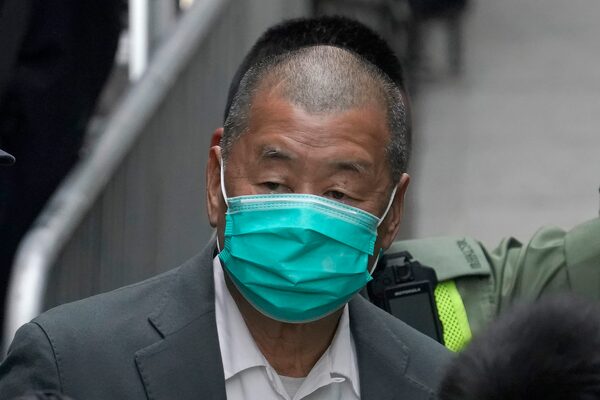
Democracy advocate Jimmy Lai leaves the Hong Kong's Court of Final Appeal, on Feb. 9, 2021.Kin Cheung/The Associated Press
A landmark national security trial in Hong Kong has been postponed until September after the government requested Beijing’s intervention to block pro-democracy tycoon Jimmy Lai’s choice of lawyer.
Mr. Lai’s trial was due to begin Dec. 1 but was delayed to this week while China’s top legislative body considered whether foreign lawyers can represent defendants in national security cases.
Officials appealed to Beijing to use its power to essentially rewrite Hong Kong’s de facto constitution after they lost multiple cases in the city’s courts trying to prevent British barrister and King’s Counsel Timothy Owen from representing Mr. Lai.
Beijing has still not issued a ruling, and on Tuesday a panel of national security judges hand-picked by Hong Kong’s leader postponed Mr. Lai’s trial – expected to last 40 days – until Sept. 25, 2023, almost three years after his arrest.
Few defendants in national security cases have been granted bail, and Mr. Lai is already facing multiple prison sentences on other charges, including a six-year term for fraud handed down last week. That case involved the breach of two lease arrangements, one of which dated back to 1998, that only came to light in the midst of a crackdown against opposition figures that began in 2020.
As the publisher of the pro-democracy Apple Daily, 75-year-old Mr. Lai has long been a figure of loathing for Beijing and its supporters in Hong Kong. He has often been painted in state media as collaborating with foreign powers to mastermind the protests that rocked the city in 2019.
As well as the fraud and national security charges, he has been convicted in three cases of “unauthorized assembly” regarding protests last year.
“Beijing seems intent on imprisoning one of its most powerful critics for many years, possibly for the rest of his life,” said Maya Wang, associate Asia director at Human Rights Watch.
HRW accused Hong Kong authorities of breaching the International Covenant on Civil and Political Rights – to which the city is a signatory but China is not – in its treatment of Mr. Lai, adding that the concerted efforts to stop Mr. Owen representing his client will further undermine confidence in the rule of law.
Eric Lai, a non-resident fellow at the Georgetown Centre for Asian Law, told The Globe and Mail this month that blocking Mr. Owen seems to be designed to allow the government “to further control the process and outcome of Lai’s trial.”
Unlike local lawyers, who are more susceptible to political pressure, Dr. Lai said the government may be concerned about what a foreign counsel “would tell the public during and after the trial.”
Numerous other Hong Kong opposition figures remain in custody awaiting trial or sentencing since the mass arrests of 2020, including Joshua Wong, the iconic former student activist, and Benny Tai, an academic credited with inspiring the Umbrella Movement of 2014.
Both have pleaded guilty to national security charges relating to a primary election organized by opposition parties that authorities claimed amounted to a “conspiracy to commit subversion.” Their legal teams hope that by entering guilty pleas they will avoid the maximum sentence of life in prison.
 James Griffiths
James Griffiths